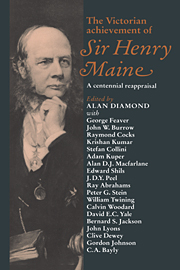Book contents
- Frontmatter
- Contents
- Notes on contributors
- Foreword by Sir John Lyons
- Introduction
- 1 The Victorian values of Sir Henry Maine
- PART 1 MAINE AND THE IDEA OF PROGRESS
- PART 2 MAINE AND THE SOCIAL SCIENCES
- PART 3 MAINE ON LAW, LEGAL CHANGE AND LEGAL EDUCATION
- 11 Maine and legal education
- 12 Maine and legal education: a comment
- 13 A wake (or awakening?) for historical jurisprudence
- 14 Further thoughts on Maine's historical jurisprudence
- 15 Fictions, equity and legislation: Maine's three agencies of legal change
- 16 Law and language: a metaphor in Maine, a model for his successors?
- 17 Linguistics and law: the legacy of Sir Henry Maine
- PART 4 MAINE AND INDIA
- Appendix: the conference programme
- Bibliography
- Index
13 - A wake (or awakening?) for historical jurisprudence
Published online by Cambridge University Press: 04 September 2009
- Frontmatter
- Contents
- Notes on contributors
- Foreword by Sir John Lyons
- Introduction
- 1 The Victorian values of Sir Henry Maine
- PART 1 MAINE AND THE IDEA OF PROGRESS
- PART 2 MAINE AND THE SOCIAL SCIENCES
- PART 3 MAINE ON LAW, LEGAL CHANGE AND LEGAL EDUCATION
- 11 Maine and legal education
- 12 Maine and legal education: a comment
- 13 A wake (or awakening?) for historical jurisprudence
- 14 Further thoughts on Maine's historical jurisprudence
- 15 Fictions, equity and legislation: Maine's three agencies of legal change
- 16 Law and language: a metaphor in Maine, a model for his successors?
- 17 Linguistics and law: the legacy of Sir Henry Maine
- PART 4 MAINE AND INDIA
- Appendix: the conference programme
- Bibliography
- Index
Summary
I start with the proposition that Henry Maine is something of a puzzle. On the one hand, he was one of the two or three most formative thinkers in my own life. He was the first legal scholar I read, as a law student, who was also a genuine ‘man of letters’. It seemed to me that, in the course of a few volumes, he transformed ‘law’ from a technical and professional ‘box of tools’ (to borrow a phrase the late Joan Robinson applied to economics) into a museum of past civilizations and remote societies all teeming with unexpected associations with our own legal system; he brought the whole range of classical mythology into the realm of legal learning; and he humbled the student of the common law, making him feel ignorant, even naked, before the magisterial eminence of Roman law. Along the way, he offered marvellously perceptive critiques of various ‘schools’ of legal theory, ranging from natural law to positivism, together with insights into the leading exponents of each, such as Grotius and Austin, including everything from Bentham's ‘Political Economy’ to chips from Max Müller's philological workshop. His withering dismissal of Rousseau and his ‘romanticism’ remains, to this day, a devastating argument against easy assumptions about a Golden Past of ‘Noble Savages’.
- Type
- Chapter
- Information
- The Victorian Achievement of Sir Henry MaineA Centennial Reappraisal, pp. 217 - 237Publisher: Cambridge University PressPrint publication year: 1991
- 1
- Cited by

